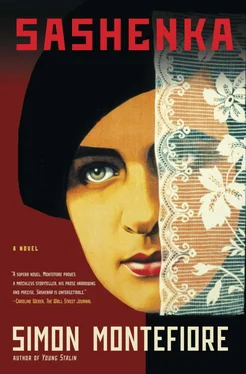He flicked his cigarette onto the tracks. What was this “family research” of Katinka’s? he asked himself yet again. In Russia, it was always better to leave the past alone. Here it had a way of poisoning the present. Without Academician Beliakov’s insistence that Katinka would be safe, he would never have let her go to London.
Katinka, he decided, was a bright bird of paradise stuck in a dingy cage: he had to let her fly. Unlike his old father, Dr. Vinsky was no Communist, yet, in these times of turbulence—in which chaos, corruption and democracy reigned—he yearned for stability.
Perhaps this was why he felt uneasy about Katinka’s journey. She was traveling into a world where he could not protect her.
The trip—the train ride to Moscow, the flight from Sheremetyevo Airport—was so dizzyingly exciting that Katinka recorded every moment in a diary she had bought especially. She described the people she met on the train, the check-in at the airport, the passengers who sat on either side of her on the flight (she had never flown before); her trip into London on the grimy Metro (or the Tube, as the English gracelessly called it), which was so dark and sordid compared with the vaulted marble cathedrals that were Moscow’s underground stations; and then the walk, staggering with her bag, from Sloane Square Station. And there she was, staring with wide-eyed amazement at the discreetly luxurious hotel booked for her in Cadogan Gardens, Chelsea.
The receptionist, a waxy paper pusher with a weave-over hairstyle, did not seem too pleased to see her. When he realized she was Russian, he appeared suspicious, examining her passport as if it might contain some trace of KGB biological weaponry. When he looked up her reservation and found it was prepaid in cash, she could see him re-evaluate her, reducing her status from KGB agent to gangster’s moll.
“What are you doing in London? Sightseeing or…,” he asked, without looking up from behind the desk.
“I’m a historian,” she replied, in hesitant English, trying not to giggle at his confusion. She thought she saw him shake his head a little: prostitute, spy or…or historian, he couldn’t work it out.
Upstairs in her room, she could only wonder at the canopied double bed and the marble bathroom containing two, yes two, basins, two, yes two, fluffy bathrobes and an Aladdin’s cave of free shampoos, soaps and bubble baths (all of which she immediately hid in her bag to take home), and cable television. It was so different from her home in the north Caucasus or her room in the dormitory in Moscow where she had lived for three years.
The desk was equipped with embossed envelopes and writing paper (straight into the bag with them too!). There were goosefeather pillows, bedspreads, curtains, pelmets like a palace, and downstairs a sitting room, silent except for a ticking grandfather clock, with deep well-stuffed sofas and piles of glossy new magazines such as Vogue and something called the Illustrated London News . Oh, the very Englishness of it! What a mercy, she thought, that her English had been so good at school and that she remembered some of it. When she had looked around, the receptionist gave her a note in a typed envelope:
Pick-up tomorrow 9:00 a.m. Your driver is Artyom.
This struck her as so iconic that she stuck it in her diary for posterity. Before taking a stroll around Sloane Square and down the King’s Road, she called her parents from the room to tell them she was safe. She got her father, who was always agonizingly shy on the phone.
“Katinka, trust no one out there,” he warned her, between gaping silences.
“They’re terrified of us here, Papa. In the hotel, they think I’m a gangster or a spy!”
“Promise me you’ll take no risks, darling,” he said.
“Oh, Papa. OK, I promise: no risks. I kiss you, Papa. Love to Mama and Baba and Bedbug!”
She laughed to herself—how could he understand? She adored her father but she could imagine him on the phone by the bookcase, smoking a cigarette late at night, in that faraway cottage in a village “lost in deafness”—while she was in London now. But when she got into her sumptuously soft bed with its incredible wealth of pillows, she closed her eyes and wondered what on earth she was doing there. A spiked barb of anxiety lodged deep inside her drumming heart.
Next morning, after an English breakfast of toast, marmalade and fried bacon and tomatoes (she ordered much of the menu), Katinka found a shaven-headed Russian man of military bearing standing in the lobby and staring at her with ill-concealed contempt. So this was Artyom, she thought, as he nodded toward the door and directed her to a large black Mercedes that smelled deliciously of new leather.
Artyom climbed stiffly into the seat right in front of her and she heard the locks click shut on all four doors. As he swung the car aggressively into traffic, pressing her against the passenger door, Katinka examined his hulking shoulders and muscle-knotted neck with foreboding. She felt small and helpless and wondered if her father, whom she’d so recently mocked for his caution, had been right after all.
What if her entire trip was a wicked trick arranged by some Russian master criminal? Was she about to be sold into white slavery? But why would a Thief-in-Power, as Russian gangster godfathers were known, bother to ask Academician Beliakov, author of the classic work Law-making and State-building under Catherine II: The Legislative Commission , to place an advertisement for him in the Humanities Department Gazette ? Beliakov had been invited to put forward his top history graduate. And why would a gangster want a historian when surely the provincial villages and Muscovite streets were seething with booted, miniskirted girls eager to be sold into white slavery in London or New York?
“Where are we going?” she asked Artyom anxiously.
“The house,” muttered Artyom, as if this answer was already causing him considerable weariness.
“Who am I meeting?”
“The boss.” These two words fatigued him even more.
“Mr. Getman?” she asked.
Artyom did not answer.
“Is he very rich, Artyom?”
Artyom snorted with heavy-breathed superiority, and altered the air-conditioning on his gleaming dashboard as if he were piloting a supersonic MiG fighter.
“How did you come to work for Mr. Getman?”
“I served in the Spetsnats in Afghanistan,” he replied.
Katinka was amused that every thug and nightclub bouncer in Russia claimed to have fought with the Special Forces in Afghanistan. If all of them had been telling the truth, Russia might have won the war.
“Is Mr. Getman one of the oligarchs?”
There was another long, sneering pause as the Mercedes swung from the inner circle of Regent’s Park into a discreet driveway. High gates shivered, then opened slowly. Katinka heard the crunch of the Mercedes’s wheels on thick gravel and gasped at the beauty and scale of the house, a perfectly proportioned Queen Anne mansion hidden in the woods of Regent’s Park, right in the middle of London, one of those secret places that had been owned, she was told later, by several of the legendary millionaires of the past.
Artyom marched round to open Katinka’s door. “This way, girl,” he said, without looking at her. He turned and loped up the steps.
Katinka followed him nervously into a black-and-white-floored hall breathing fresh paint and polish, and where portraits of ruddy-cheeked English earls in bulging pantaloons and velvet frock coats glared down at her. A charging red-coated cavalryman, saber outstretched, caught her eye roguishly from a broad gold-framed canvas hanging on the sweeping staircase with the shiny oak banisters. But where was Artyom? Katinka looked round frantically, but the house seemed silent and forbidding. Then a door concealed in the opulent chinoiserie wallpaper swung on its hinges. She opened it and saw Artyom’s broad back turn a corner. Relieved, she ran after him into a gloomy corridor lined with framed English cartoons. He opened a black door. Bright sunlight pouring through a line of windows blinded her momentarily. Raising a hand to her eyes, she blinked and tried to gather herself.
Читать дальше












